Research Laboratories
Lafayette ChBE has modern facilities and equipment, from which cutting-edge research can be performed.
Research Laboratories
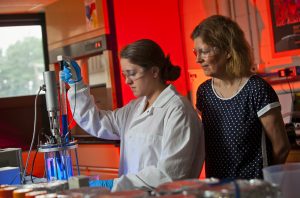
Working with Professor Polly Piergiovanni on a Fluid Pump Flow experiment Clare Boothe Luce Scholar Rachel Tenney ’18 pipets.
Students whom are participating in an Honors Thesis, Independent Study, or one of our several Chemical Engineering Elective Courses will have opportunities to work with novel equipment and processes in our department’s Research Laboratories.
Please follow the following link for more information about the exciting research taking place in our department.
Food Engineering Lab
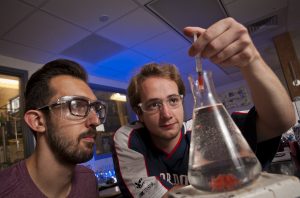
Under Professor Polly Piergiovanni, Matt Katz ’17 (left) and Russell Lambert (right) characterize spherification of various hot sauces.
The Food Engineering Lab (AEC 131A). This lab contains a Bostwick consistometer, multiple water baths and dehydrators, and custom experimental setups designed to analyze non-Newtonian fluid pumping, impeller geometries, and flat-plate heat exchanger analysis.
Polymer Synthesis Laboratory
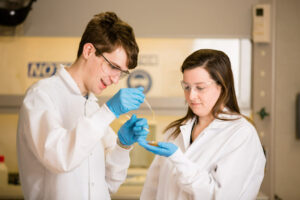 The Polymer Synthesis Lab (AEC 218). The facilities features an array of material characterization equipment, including a thermogravimetric analyzer, dynamic mechanical analyzer, zetasizer, and planar biaxial testing machine. The Polymer Synthesis Lab also features UV-visible spectrophotometer and a FTIR.
The Polymer Synthesis Lab (AEC 218). The facilities features an array of material characterization equipment, including a thermogravimetric analyzer, dynamic mechanical analyzer, zetasizer, and planar biaxial testing machine. The Polymer Synthesis Lab also features UV-visible spectrophotometer and a FTIR.
Thermophysical Properties Laboratory
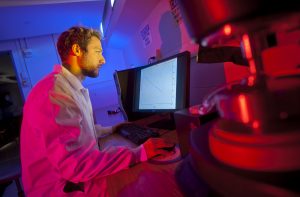 The Thermophysical Properties Lab (AEC 202.) This lab features a hybrid rheometer, a differential scanning calorimeter, and an HLPC/GPC/SEC system.
The Thermophysical Properties Lab (AEC 202.) This lab features a hybrid rheometer, a differential scanning calorimeter, and an HLPC/GPC/SEC system.
Center for Molecular Bioengineering
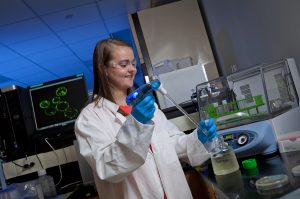
Clare Boothe Luce Scholar Colleen McGovern ’18 works on cell plate preparation.
The Center for Molecular Bioengineering (Acopian 232) is a recently renovated laboratory space in Acopian Engineering Center, adjacent to the Chemical Engineering Unit Operations Laboratory. The Center is partitioned into several “suites”, each enabling a core research area of expertise in molecular bioengineering: real time RT-PCR, biaxial materials testing with digital image correlation, biomaterials fabrication, protein crystallization and separation, and state-of-the-art microscospy, including an inverted fluorescence phase contrast microscope and an inverted confocal microscope with a 60” flat panel monitor to increase teaching capabilities. Other capital equipment include a Nanodrop spectrophotometer, protein electrophoresis equipment, chromatography apparatus, microcentrifuge, refrigerated centrifuge, chemical hood, refrigerator, and -20oC freezer. The Center is dedicated to undergraduate teaching laboratories and to student/faculty research in bioengineering.
Environmental and Energy Engineering Laboratory
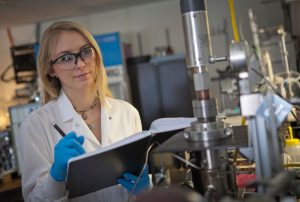 The Environmental and Energy Engineering Laboratory (AEC 233B) is equipped with state-of-the-art instrumentations to conduct its ongoing research in the biodiesel production and green engineering. The facilities include a gas-chromatograph/mass spectrometer, supercritical fluid extractor, and supercritical fluid reactor as well as being outfitted ancillary equipment such as an analytical balance, block heaters, freezer, and a laminar flow hood.
The Environmental and Energy Engineering Laboratory (AEC 233B) is equipped with state-of-the-art instrumentations to conduct its ongoing research in the biodiesel production and green engineering. The facilities include a gas-chromatograph/mass spectrometer, supercritical fluid extractor, and supercritical fluid reactor as well as being outfitted ancillary equipment such as an analytical balance, block heaters, freezer, and a laminar flow hood.
Interfacial Laboratory
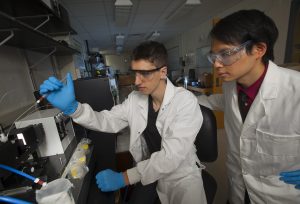
Assistant Professor Joseph Woo and Thomas Beier ’19 using pendant drop tensiometry.
The Interfacial Laboratory (AEC 233C) is equipped to measure interfacial phenomena under a variety of controlled ambient conditions relevant to atmospheric and biological applications alike. This facility features a pair of Sinterface profile analysis tensiometers fitted with a custom-built water vapor/organic gas delivery system.
Mammalian Tissue Culture Laboratory
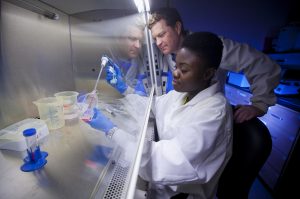
Working with Professor Chris Anderson Aaliyah Shodeinde ’17 works on Cell Culture Preparation in the lab.
The Mammalian Tissue Culture Laboratory (Acopian 235) is located directly across the hall from the Center for Molecular Bioengineering. It is equipped with a biological safety cabinet, CO2 incubators, and necessary supporting apparatuses to grown and maintain mammalian cells in culture, such as a water bath, refrigerator, -20oC freezer, and a -80oC freezer, and an inverted phase contrast microscope with image acquisition and analysis capabilities. The cell culture suite is dedicated to student/faculty research projects and in teaching laboratories (in ChE 372: Biomolecular Engineering) to introduce students to sterile cell culture techniques.
Micro and Nanofabrication Laboratory
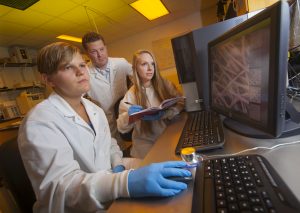
Clare Boothe Luce Scholars left Rachel Young ’18 and Kyla Dewey ’18 right work with Professor Chris Anderson in using the Scanning Electron Microscope.
This facility is planned as a center for fabricating micro- and nano-scale devices that explore various transport and kinetic phenomena. Research to be conducted in this facility will largely be in the area of microfluidics and semiconductor processing. Targeted courses that will use this facility include experimental design, integrated chemical engineering, and process design.
This laboratory will be equipped with all of the components necessary to pattern planar substrates, performing both traditional photo- and soft-lithography. Photomasks will be an outsourced item, with specific room lighting requirements created using light filtration in designated areas. Equipment includes the following: spin-coater, hotplate, UV exposer, developer, plasma reactor, vacuum oven, and casting systems. Substrate analysis will be performed using ellipsometry, profilometry, and a microscope equipped with digital imaging. Fluid flow introduced to a particular device will be controlled using one or more syringe pumps.